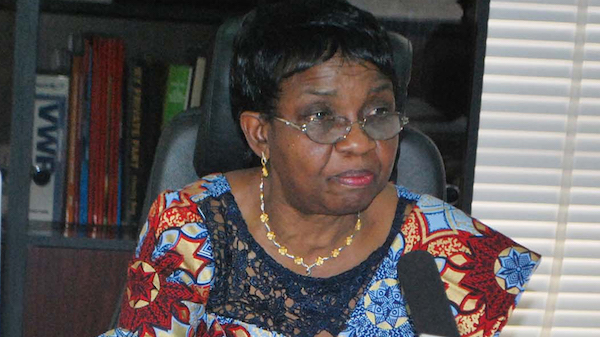News
NAFDAC DG raises alarm over life threats, calls for death penalty for fake drug offenders

The Director-General of the National Agency for Food and Drug Administration and Control (NAFDAC), Prof. Mojisola Adeyeye, has expressed grave concern over the threats to her life and the safety of the agency’s staff, urging the government to provide more protection as they continue to combat the dangers posed by counterfeit and substandard drugs.
Speaking during a State House briefing at the Presidential Villa in Abuja on Wednesday, Prof. Adeyeye disclosed that NAFDAC had recently seized illicit drugs worth over N1 trillion in a relentless crackdown on the production and sale of fake pharmaceutical products in Nigeria.
Describing the agency’s efforts as a major operation in the fight against illegal drugs, Prof. Adeyeye explained that NAFDAC had confiscated 87 truckloads of banned, expired, and substandard medical supplies. These items included USAID- and UNFPA-donated antiretroviral drugs, male and female condoms, and other compromised medical products.
This operation, targeting the nation’s three largest open drug markets, was the biggest in NAFDAC’s history, according to the agency’s boss. Prof. Adeyeye estimated the value of the seized items to be at least N1 trillion, with the possibility that the final figure could be higher after further assessment.
However, the fight against counterfeit drugs comes at a personal cost, as Prof. Adeyeye revealed that NAFDAC staff members have faced severe threats, including kidnapping attempts. She recalled an incident six months ago in which one of the agency’s staff members in Kano had his child kidnapped due to his involvement in NAFDAC’s operations, although the child fortunately managed to escape.
Read also: Reps urge Wike to appoint substantive Auditor-General for FCT Area Councils
“My staff members have been facing physical threats, and I have experienced attempted murder myself. One of our staff members in Kano had his child kidnapped because he was doing his job. Fortunately, the child escaped,” Prof. Adeyeye said.
The NAFDAC DG also shared how she personally faces constant danger, stating, “I have two policemen living in my house 24/7 in Abuja and Lagos. I don’t have a life. I can’t go anywhere without police escorts. That’s not my way of living, but I don’t have a choice because we must save our country. Nonetheless, I also use common sense.”
Prof. Adeyeye’s struggles in the fight against counterfeit drugs echo those of her predecessor, Prof. Dora Akunyili, who led NAFDAC from 2001 to 2009. Akunyili was also targeted by drug cartels due to her unyielding battle against fake drugs, a mission she took up after the tragic death of her sister from counterfeit insulin. Like Akunyili, Prof. Adeyeye is resolute in her determination to rid Nigeria of counterfeit drugs, despite the grave personal risks involved.
In addition to the ongoing enforcement operations, Prof. Adeyeye advocated for harsher penalties, including the death penalty, for those involved in the illegal drug trade. She called on the Nigerian government to strengthen laws and take more decisive action to combat the counterfeit drug menace, which continues to jeopardize public health.
“I believe that those involved in the production and sale of fake drugs should face the death penalty. It is time for stronger laws to protect our citizens from these killers,” Prof. Adeyeye stated.
NAFDAC remains steadfast in its commitment to protecting public health and restoring confidence in Nigeria’s pharmaceutical industry through continued enforcement actions nationwide.
Join the conversation
Support Ripples Nigeria, hold up solutions journalism
Balanced, fearless journalism driven by data comes at huge financial costs.
As a media platform, we hold leadership accountable and will not trade the right to press freedom and free speech for a piece of cake.
If you like what we do, and are ready to uphold solutions journalism, kindly donate to the Ripples Nigeria cause.
Your support would help to ensure that citizens and institutions continue to have free access to credible and reliable information for societal development.




























